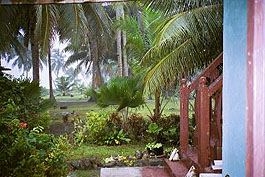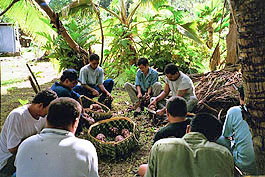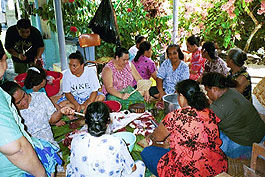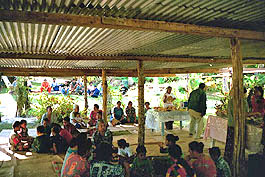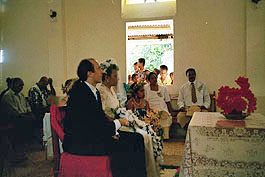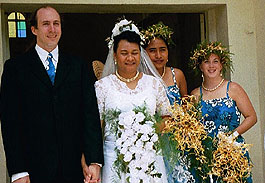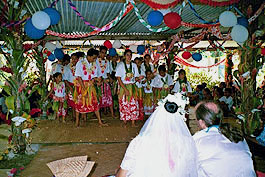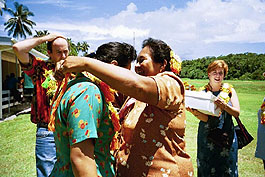by Nancy Smith
My son Daniel was married on 27 December 2000 to Maggie Tolo, a lovely young Rotuman lady. They met working for Habitat for Humanity's South Pacific Regional Office. So I had the great privilege of making my first trip out of the U.S. to attend and participate in a traditional Rotuman wedding.
My trip to Rotuma had highs and lows. The heat did me in; even before we left Suva for the island of Rotuma I saw a doctor for dehydration and checked into an air-conditioned hotel for two nights. On Rotuma (armed with the medicines from the doctor) I learned to sit quietly and fan. I cannot imagine being able to work in that environment. But the people were engaged in physical labor almost constantly. The heat index was 100 degrees and there was no air conditioning and no ice. Flies and mosquitoes are a constant problem but fanning for the heat also fans away the bugs. I slept under mosquito netting, taking my fan and a wet cloth with me. I learned to fan myself to sleep, which is what the women there do.
The highs included the people, their devotion to God, the music and dancing, the interesting and unusual wedding customs, the "fara" (youth going house-to-house singing and dancing in the middle of the night during the Christmas season), the fun, the beaches and warm Pacific water -- and the orchids, coconuts, pineapple, and bananas that grow in abundance. We had great watermelon at every meal and between meals. It is one of the crops that Maggie's father raises. He also raises kava and various root vegetables that are not familiar to me.
The roosters that woke us each morning before dawn reminded us of their presence throughout the day. Apparently animals are raised for their meat -- no eggs were gathered and no milking was done. But the livestock are lean and muscular, not fattened up for market as in the U.S. The church wedding ceremony was quite traditional -- no promise to obey but "I plight thee my faith" threw both of them as the minister had not gone over the vows with them ahead of time. Dan said he almost stopped and asked "What was that word again?" The church building is 170 years old, with thick limestone walls. Instead of a church bell, the caretaker beats a traditional drum, made from a hollow log. He does this an hour before, a half-hour before, and just before, services.
I had to make a speech during the wedding ceremony. I am glad we don't have to do that here, as it is really too emotional a time to try to talk publicly to your child and his or her spouse. But I did it, first having Dr. John review it for cultural appropriateness, and he also translated it into Rotuman as I gave it. An uncle gave the corresponding speech for Maggie's family. If Dan had had a male relative present, he would have given the speech -- perhaps because men are less likely to get teary-eyed! The wedding customs on Rotuma seem to be a method of redistributing valued goods (food, lengths of new fabric, and mats) to others in the community. Daniel commented that the village system on Rotuma was the best he has seen in the South Pacific. Those who live off-island assist their families by sending cash as there is no real cash-based work on Rotuma itself.
The aspects that I am still contemplating include the form of community and mutual care-taking on which the village culture is built. I wasn't there long enough to hear much of the dissatisfaction that, being human, they must also feel as they bear each other's burdens within their neat and clean villages. The chiefly system is paternalistic (though women can also be chiefs) and thus can be very benevolent or not, depending on the chief and the tenor of the the Council of Chiefs. Our chief seemed very gracious and kindly. I danced with him at the wedding and the band improvised to the delight of the guests, singing in Rotuman something to the effect of "Nancy's dancing with the chief. His wife isn't here; she's going to come and take him home by the ear!"
I watched men climbing coconut trees for both the coconuts and the leaves; men weaving/braiding food baskets from coconut leaves, men preparing and tending the lovo (earth oven), women sweeping with brooms made from coconut leaves, women sitting on the floor making tubs full of sandwiches, both men and women butchering and processing beef, both men and women peeling and preparing dalo (which is their staple starchy vegetable), men putting up the wedding shed and women decorating it, women fanning the flies from the food and serving it, men singing (an all-male band played at the wedding), men and women dancing, men and women singing acapella harmony in church.
When I asked Maggie's father after the wedding how many animals they killed for the feast, he beamed, "Five cows, four pigs, 20 chickens -- and 16 cases of corned beef!" I was in awe of their ability to kill, butcher, process, and cook meat so quickly and efficiently, while he seemed to be in awe of the number of cases of corned beef! The heat, the lack of electricity, the dawn-to-dark life, the numbers of people and level of work activity all around me -- these things prevented my keeping a journal and also interfered with any contemplation -- though I was always consciously amazed about everything and in many ways thought the island must be God's second attempt at creating Eden! My experience leads me to contemplate the theme of hospitality -- especially the generous hospitality of the people on Rotuma.
Photos by Nancy Smith |
